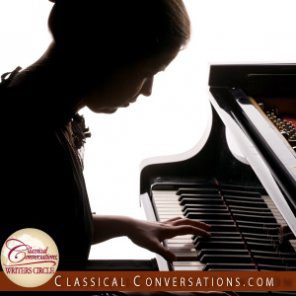For what should be the end of music
if not the love of beauty? – Plato
When I took piano lessons, I hated doing music theory. I did not see that my stumbling and fumbling over pieces that required sight-reading and other knowledge of music theory was a result of my poor effort in the subject. Piano was boring, but music theory was even more boring. I loved playing mostly by ear because I was good at it. I felt accomplished when I would figure out the chord progression of a Coldplay song or an Elton John melody. This kept me interested in the piano long after I managed to “trick” my parents into letting me stop taking lessons. As I developed my piano skills, I found myself being drawn back into music theory. Any progress that I made while learning the piano was a result of my asking questions about the theory of the songs I already knew how to play. I began to realize that my musical abilities would not continue to develop without more study on the grammar of music.
Musical talent can never be separated from some kind of commitment to musical theory. It is not something that a good musician or musically gifted person chooses to do or not to do. Even someone with the most gifted ear, someone who can play a piece of music after listening to it once, has an enormous commitment to theory regardless of whether their knowledge came through formal or informal experiences. Music theory is most often thought to be a study in the structures of music that serves as a tool to aid in one’s musical development. While this is obviously true, I want to suggest that music theory affects more than our musical progress.
Music theory can be more than the ability to understand the various intervals involved in a diminished triad or in a perfect or imperfect cadence. It teaches how to communicate well through studies of order, harmony, relationships, ratios, dissonance, consonance, tension, and time. Within these studies, one is pushed past the mere notes and ideas of a score to discover more of music’s grandiose purpose. Many of us do not generally think about music or the arts as means for understanding God, but studies in music theory can help one understand that form is important to our Creator and that it should be used in ways that reflect His character. This is an appropriate pursuit of the beauty that Plato wrote about.
Today, musical literacy is generally being lost in Christian circles. Too many of us do not know how to think about or listen to music well. In many cases we are inclined to think that music makes no claims about objective truth and therefore musical judgments are dependent upon the individual as are the preferences of taste and experience. Oftentimes, music is used as an escape from the trials of our daily responsibilities. Today, music’s purpose has become one of self-absorption more than a purpose of understanding God and His beauty. This is not only a product of post-enlightenment thought, but it is also disrespectful to God and His promised blessings of revealing himself to us.
If we in the Classical Conversations community are about educational reform, if we are about communicating effectively, if we want to communicate beautifully, if we want to seek God to make Him known, we must adopt music education. This begins with a study of music theory. If we want to study the history, the philosophy, or even the theology of music, we must first familiarize ourselves with its grammar. As our trivium model teaches the grammar of reading and writing words in order to speak and argue well, so too should we teach the grammar of reading and writing music so that we can play and create well. We play and create well with the intention to glorify God and discover His beauty.
My experiences with music theory have helped my musical performance and knowledge in extraordinary ways, but it has also caused me to step outside of myself and realize there is far more to music than how it affects me as an individual. In an era in which scientific reason permeates most of the western world, artists must refuse to subject God’s gifts to an individualistic way of thinking. The arts are tools for hope to see beyond the material, beyond self. God gives us art so that humans can aspire to see the mysteries of this world, the beauty within creation, and the character of a God who desires that His created people know their Creator.
Music can be complex, mysterious, confusing, and vague. Yet it continues to pull mankind to itself, inviting us to dive into the ocean of its greatness, always reminding us that its possibilities are still to be discovered. Similarly, God’s beauty is so vast and magnificent it will require infinity to uncover His glory as He reveals himself to us. In so many different ways, God invites us to uncover bits of His glory while we are on earth so as to give us a foretaste of the unending sweetness of heaven. In heaven we will no longer search, rather we will experience the entirety of the awesome magnitude of God’s beauty. Music theory is, then, a gift to man through which God invites us to discover the true beauty: himself.
Studying music or any other subject with the purpose of discovering the beauty of God will never be boring.




